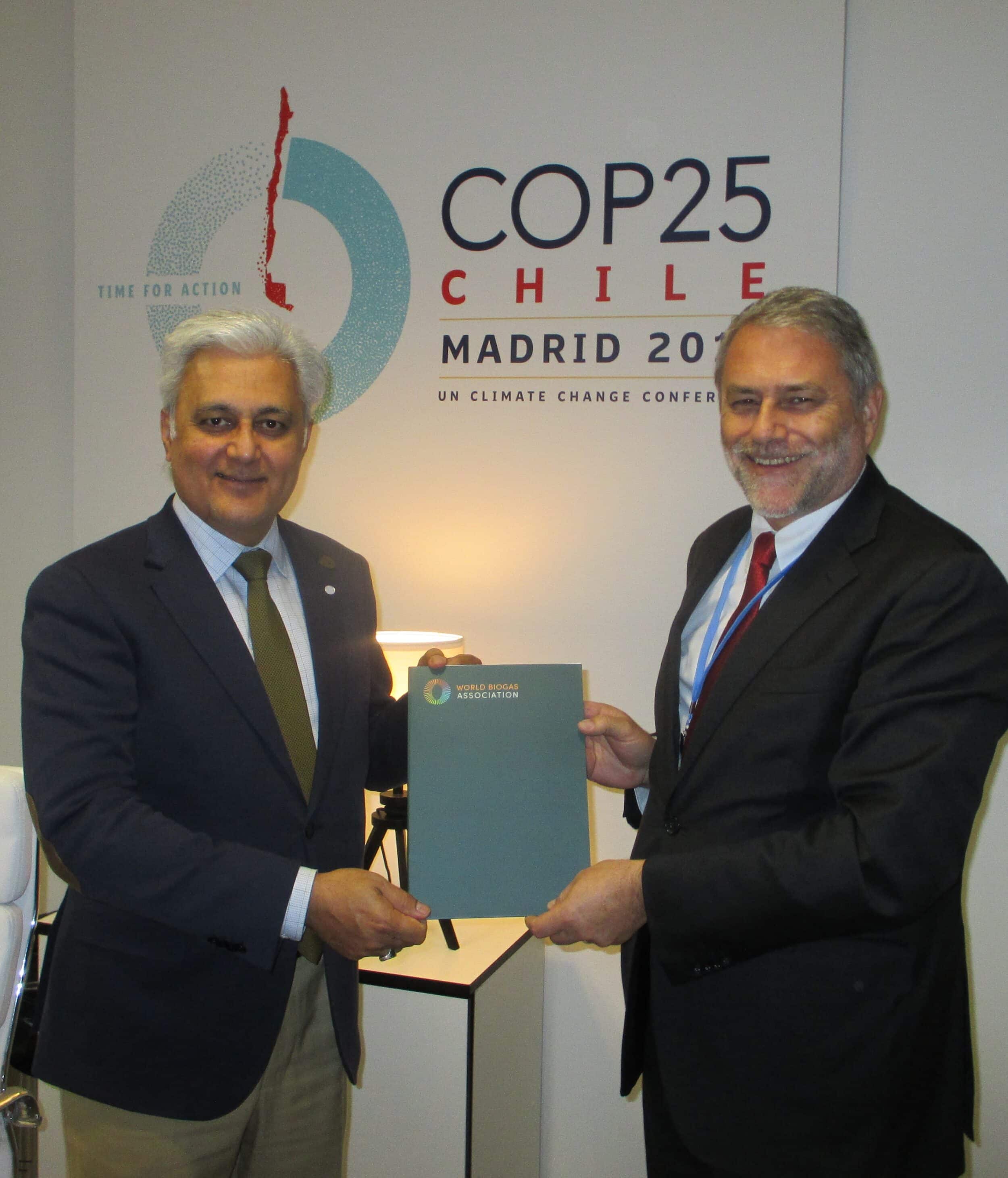
World Biogas Association presents UNFCCC with industry commitment to deliver 12% global GHG emissions reduction by 2030 at COP25.
- WBA President David Newman presents H.E. Mr Ovais Sarmad, Deputy Executive Secretary of the UN Climate Change Secretariat with the Biogas and Climate Change Commitment Declaration at COP25
- In the Declaration, major biogas industry players commit to delivering a 12% reduction in global greenhouse gases emissions by 2030 provided world governments help unlock the sector’s potential
- H.E. Mr Ovais Sarmad praises the industry for setting an important example

On Friday 6th December at the UNFCCC Conference of Parties in Madrid (COP25), David Newman, President of the World Biogas Association (WBA) presented H.E. Mr Ovais Sarmad, Deputy Executive Secretary of the United Nations Climate Change Secretariat, with a Declaration recently signed by the Association and major industry companies in which they commit to deliver a 12% reduction of global greenhouse gases (GHG) emissions by 2030 – subject to the barriers to the industry’s growth being removed by world policy makers.
In their Biogas and Climate Change Commitment Declaration, unveiled on 27th November this year, biogas industry leaders call on world governments to unlock the sector’s considerable potential towards meeting their Paris Agreement targets. In return, they commit to putting their full human, financial and technological resources behind enabling the rapid expansion of biogas in all parts of the globe.
A WBA report published in the summer shows that the biogas industry could abate up to 4bn tonnes of CO2 equivalent annually. This represents at least 12% of today’s global emissions, by 2030. Today, only 2% of the feedstock available globally to produce biogas is captured and recycled.
On presenting the Declaration, David Newman said: “The need for urgent action is clear to all; Governments alone cannot resolve the climate change emergency, they need help. The biogas industry can offer technologies and the mobilisation of huge financial resources to help reduce GHG by 12% within a decade. But Governments have to do their part too, in creating the right frameworks for the investments to be made. We support the UN process and our corporate members commit to doing their part to help this process become reality, there is no time to lose.”
H.E. Mr Ovais Sarmad responded: “I thank you for bringing us this important commitment. The UN negotiating process alone is not enough; we also need innovation, technologies, private sector investments, to make national commitments a reality on the ground. The scale of the commitment by the global biogas industry is precisely the sort of example we need and we will ensure this is transmitted to the Parties.”
Signatories to the Declaration:
World Biogas Association
Asia Biogas, Thailand
BTS Biogas, Italy and Germany
Cenergi, Malaysia
Clarke Energy, UK
DMT Environmental Technology, Netherlands and USA
Eisenmann Corporation, USA
ENGIE, France
Greenlane Renewables, Canada
Greve Biogass, Norway
Grissan, UK
IES BIOGAS, Italy
MONTELLO, Italy
NGF Nature Energy, Denmark
OMEX Environmental, UK
SHV Energy, Netherlands
SUEZ, France
WELLE Environmental Group, China
– ENDS –
For further information, contact:
Jocelyne Bia, Senior Communications Consultant
Email: jbia@worldbiogasassociation.org; tel: +44 (0)7910 878510
Notes to editors
- Press release of 27th November 2019 and Declaration
- The signatories to the Declaration are companies that develop and finance, design, build and operate industrial anaerobic digestion plants and related infrastructure globally to treat and recycle biodegradable wastes and feedstocks to produce biogas or biomethane, green CO2, natural fertilisers and other bioproducts.
- The biogas industry captures emissions from organic wastes and turns them into energy for diverse end-uses such as electricity and biomethane for heat and transport. Biogas production also generates environmentally friendly solutions for soil fertilisation. The industry can therefore help to speed up the shift away from fossil fuels towards a zero-carbon economy and a sustainable agriculture.
- The Global Potential of Biogas report highlights the potential of AD as a technology to generate renewable energy, abate GHG emissions and recover organic nutrients and carbon for use on soil. The report also sets out the potential of AD to help meet the climate change targets under the Paris Agreement.
- Launched at COP22 in Marrakesh in 2016, the World Biogas Association is the global trade association for the biogas, landfill gas and anaerobic digestion (AD) sectors, and is dedicated to facilitating the adoption of biogas globally. It believes that the global adoption of biogas technologies is a multi-faceted opportunity to produce clean, renewable energy while resolving global issues related to development, public health and economic growth. www.worldbiogasassociation.org @wbatweets

